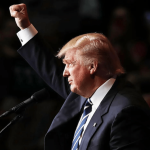US federal Appeals Court Rules Trump’s Global Tariffs Unlawful, Legal Battle Continues
A US federal appeals court has declared that the majority of President Donald Trump’s global tariffs are unlawful. The decision could severely limit the former president’s ability to unilaterally shape America’s trade policy.
The ruling came in a 7-4 vote by the U.S. Court of Appeals for the Federal Circuit. Judges agreed with the lower court that Trump overstepped his authority, calling his actions “invalid as contrary to law.” Yet the tariffs remain in place until mid-October, pending an appeal to the Supreme Court.
“Because we agree that [International Emergency Economic Powers Act’s] grant of presidential authority to ‘regulate’ imports does not authorize the tariffs imposed by the Executive Orders, we affirm,” the court wrote.
The decision highlights one of the most significant legal questions facing the Supreme Court: how far can a US president go in imposing trade measures without congressional approval?
On Friday evening, Trump took to his social media platform to respond. He called the appeals court decision “destructive” and warned that blocking the tariffs “would literally destroy the United States of America.”
He also previewed the next legal challenge, urging the Supreme Court to affirm his unilateral authority over tariffs.
“Now, with the help of the United States Supreme Court, we will use them to the benefit of our Nation, and Make America Rich, Strong, and Powerful Again! Thank you for your attention to this matter,” Trump posted.
At the heart of the ruling is the interpretation of the International Emergency Economic Powers Act (IEEPA). The court concluded that only Congress, not the president, has the authority to impose tariffs.
Seven judges agreed that the law does not grant Trump the power to implement either the “reciprocal” tariffs or the “trafficking” tariffs, which targeted Canada, Mexico, and China to curb fentanyl flow into the US.
“We discern no clear congressional authorization by IEEPA for tariffs of the magnitude of the Reciprocal Tariffs and Trafficking Tariffs,” the majority wrote.
A subset of four judges went further, arguing that IEEPA grants no tariff power at all.
“The Government’s interpretation of IEEPA would be a functionally limitless delegation of Congressional taxation authority,” they stated.
Conversely, four judges disagreed. They argued that declaring a national emergency could justify the tariffs.
“IEEPA’s language, as confirmed by its history, authorizes tariffs to regulate importation,” they noted.
The dispute began earlier this year when a coalition of small businesses and states challenged Trump’s tariffs, citing overreach under IEEPA. The Court of International Trade in New York ruled the tariffs unlawful in May, prompting a swift appeal from the Trump administration.
Most of President Trump’s global tariffs were ruled illegal by a federal appeals court that found he exceeded his authority in imposing them, but the judges let the levies stay in place while sending the case back to a lower court for further proceedings https://t.co/dIu77O5ogA pic.twitter.com/g3NxIQpe9h
— Bloomberg TV (@BloombergTV) August 29, 2025
During July hearings, judges expressed doubts over whether a national emergency could justify tariffs. “One of the major concerns I have is that IEEPA doesn’t mention tariffs anywhere,” one remarked.
Ahead of Friday’s decision, U.S. Solicitor General John Sauer requested a stay to prevent “serious harms” to ongoing trade negotiations and national strategy. Trump officials had warned that removing tariff authority could cause diplomatic embarrassment and threaten broader US interests globally.
After October 14, the case will return to the lower court. Legal experts predict that the Supreme Court may ultimately decide on the scope of presidential power in trade, a ruling that could shape US economic policy for years.






